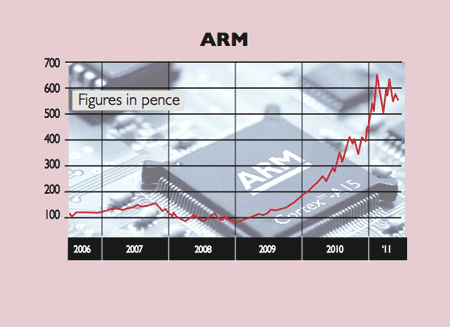
What is ARM Holdings?
Once described as “the most important technology company you’ve never heard of”, ARM researches, develops and licenses intellectual property for the microchips used in products such as mobile phones, tablet computers, PCs, media players, hard disk drives and digital TVs. It does not actually make microchips. Instead, manufacturers pay ARM a fixed fee and also royalties for every chip they make that uses its designs (usually a percentage of the chip price). ARM owns 770 separate product licences and aims to grow at a rate of 60% to 90% a year.
What’s the company’s history?
The company started life as Acorn Computers in 1978. Its BBC micro computers were used extensively in schools during the early 1980s. In 1990, Advanced RISC Machines (ARM) was spun out of a partnership between Acorn and Apple, which was set up to create a new microprocessor standard. Over the last 20 years the firm has grown rapidly as many of the world’s leading technology and consumer electronics companies have licensed its technology. In 2011, Microsoft announced that future versions of its Windows operating system will use ARM-designed chips.
How’s current trading?
Good. Revenue rose by 26% in the first quarter, driven by strong growth in licence and royalty revenues. Operating margins rose from 40.0% to 42.5%. Earnings per share are up 34%.
What’s the outlook?
The company has a healthy backlog of new licences that are yet to produce a stream of royalty payments. Over the medium term ARM aims to grow its revenues twice as fast as costs. It plans to use licence fees to cover its operating costs, leaving royalty payments as pure profit.
What could go wrong?
Soft consumer spending may reduce demand for PCs and other digital goods, leading to lower-than-expected royalty revenues. Competition from the likes of US rival Intel is a threat too.
Who runs the company?
Warren East has been chief executive since 2001, after joining in 1994 to set up the group’s consulting business. He was paid £1.0m in 2010, from £824,000 in 2009. Mike Muller (a co-founder of ARM, with current company president Tudor Brown) is chief technology officer. Tim Score – financial director of Rebus Group until 2002 – is the group finance director.
The analysts
Of the 33 analysts surveyed by Bloomberg, 30% say “Buy”, 27% “Hold” and 42% “Sell”. The average price target is 531p.The most bullish broker is Goldman Sachs with a price target of 800p, with JP Morgan most bearish with a price target of 220p. Our view: on a valuation of over 50 times 2011 earnings estimates, and offering a miniscule dividend yield, ARM shares are arguably already priced for perfection. The bullish expectation for consumer spending growth embedded in its share price may represent a good profit-taking opportunity.
The numbers
Stockmarket code: ARM
Share price 556p
Market cap: £7.5bn
Sales (2010) £407m
Net Assets (2010) £895m
Net cash £290m
P/E (current year estimate) 53.5
Yield (prospective) 0.57%
Largest shareholder: Capital Research (5.15%)
Directors’ dealings
ARM’s share price has almost doubled over the last 12 months and directors have been quick to take advantage. The 20 largest dealings in the past year have all been sells as directors cash in maturing share options. With the exception of shares in lieu of dividends and bonus shares, there have been no major purchases by the firm’s directors. Yet despite the sales, 76% of board members still own stock, which is higher than the industry average. The 0.33% of the company in directors’ hands is also more than its peers.
Director and total shares bought:
Mike Muller: 202,091
Tim Score: 200,000
Tudor Brown: 200,000
Warren East: 218,536